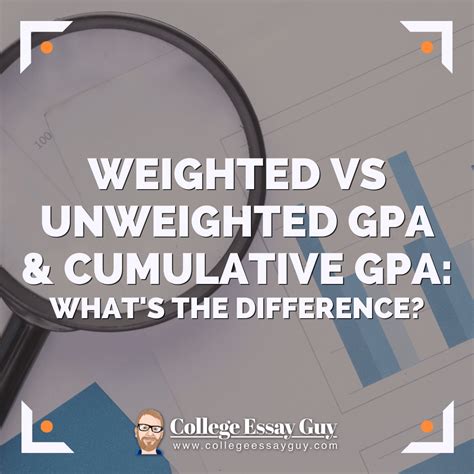When it comes to college applications, understanding the difference between weighted and unweighted GPA is crucial. These two metrics play a significant role in evaluating a student’s academic performance and impact their college prospects. Here’s a comprehensive guide to help you navigate the complexities of weighted and unweighted GPAs:

What is Weighted GPA?
Weighted GPA takes into account the difficulty level of courses a student takes. It assigns more weight to honors, Advanced Placement (AP), and International Baccalaureate (IB) courses, which are typically considered more challenging. The purpose of weighted GPA is to reward students for taking rigorous coursework and acknowledge their academic excellence.
How is Weighted GPA Calculated?
Each school district or institution has its own method for calculating weighted GPA. However, the most common approach is to multiply the grade a student earns in a weighted course by a factor that reflects the course’s difficulty. For example, an A in an AP class might be worth 4.5 points instead of the traditional 4.0 points. This extra weight gives more value to challenging courses and helps differentiate students who take a rigorous academic path.
What is Unweighted GPA?
Unweighted GPA is a straightforward average of all the grades a student earns, without considering the difficulty of the courses. It is calculated simply by adding up the numerical grades and dividing the sum by the total number of grades. Unweighted GPA provides a more standardized measure of academic performance across different schools and districts, as it does not depend on the availability of weighted courses.
Weighted vs. Unweighted GPA: What’s the Difference?
Key Differences:
| Feature | Weighted GPA | Unweighted GPA |
|---|---|---|
| Difficulty of Courses | Considers course difficulty | Does not consider course difficulty |
| Calculation Method | Multiplies grades by a factor for weighted courses | Simply averages all grades |
| Purpose | Rewards students for taking rigorous courses | Provides a standardized measure of academic performance |
Which GPA is More Important for College Applications?
Both weighted and unweighted GPAs are important for college applications, but the weight given to each varies depending on the institution. Some colleges place greater emphasis on weighted GPA, as it provides an indicator of a student’s ability to handle challenging coursework. Other colleges may consider unweighted GPA more heavily to ensure a fair comparison between students from different educational backgrounds. It is crucial to check the admissions requirements of the colleges you are applying to to determine how they evaluate weighted and unweighted GPAs.
Understanding the Impact of Weighted and Unweighted GPAs
Weighted GPA:
- Can boost a student’s GPA and make them more competitive for selective colleges
- Acknowledges the effort and ability required to take rigorous courses
- May not accurately reflect a student’s overall academic ability if they only take a few weighted courses
- Can potentially inflate a student’s GPA, making it difficult to compare them with students who took less challenging courses
Unweighted GPA:
- Provides a standardized measure that is comparable across all schools
- Reflects a student’s overall academic performance without bias towards weighted courses
- May underestimate a student’s ability if they took a significant number of challenging courses
- Can be used to compare students who took different sets of courses
How to Improve Your GPA
Whether you are aiming for a high weighted or unweighted GPA, there are several strategies you can employ:
- Take academically challenging courses: Honor, AP, and IB classes can boost your weighted GPA. However, only take these courses if you are confident in your ability to succeed in them.
- Earn high grades in all your classes: Focus on understanding the material and putting in the necessary effort to earn good grades in all your courses.
- Seek academic support: If you are struggling in a class, do not hesitate to ask for help from teachers, tutors, or classmates.
- Set realistic goals: Aim for a GPA that is achievable and reflective of your academic abilities. Do not try to inflate your GPA artificially by taking easier courses or receiving extra credit.
Conclusion
Understanding the nuances of weighted and unweighted GPA is essential for any student applying to college. By weighing the pros and cons of each metric and strategically planning your coursework, you can optimize your GPA and enhance your chances of admission to your dream schools. Remember, GPA is just one aspect of a successful college application. Focus on developing a well-rounded profile that showcases your academic achievements, extracurricular activities, personal qualities, and potential for success.
